Into the Heart of Africa: Part 7
On our final morning in the Serengeti—Thursday, June 13th—I woke knowing the safari was almost over. What had begun as a simple wildlife expedition had become something I hadn’t anticipated: a journey not just across Tanzania’s magnificent landscapes, but through questions about connection, culture, and what stories are worth telling.
“Got to sleep in and didn’t leave the lodge until 9 AM,” I wrote that morning. For the first time all week, we weren’t chasing sunrise or racing against the mandatory 6 PM curfew. We had time to simply be—to absorb everything we’d experienced, to feel the weight and wonder of it all.
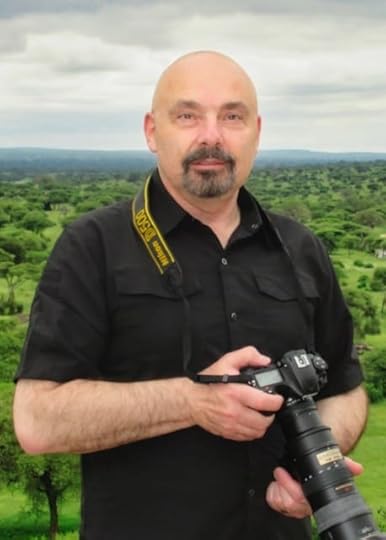 Saying Goodbye to James
Saying Goodbye to JamesJames drove us to the Seronera Airstrip for 10 AM, and the farewell hit harder than any of us anticipated. “Said goodbye to him—sad,” I noted matter-of-factly in my journal, the word barely capturing the emotion of that moment.
“He was the most amazing guide and driver we could ever have had,” I wrote. “So kind and friendly and always had a smile on his face.”
But James had been more than a guide. Over those nine days, he’d become a teacher, a translator, a bridge between our world and his. His encyclopedic knowledge of Tanzania’s flora and fauna amazed us daily. More importantly, his love for his country—its wildlife, its people, its complexity—infected us with the same passion.
Looking back, I didn’t realize at the time just how much Seronera would linger with me. It would be nearly five years later, sitting at my desk and crafting Blood Oath, that I’d return to that small airstrip in my imagination. The very same Seronera airport where we said goodbye to James became the exact place General David Martel was headed in the novel when his world changed forever. In life, it was just another farewell at the end of a journey—but in fiction, it became a turning point.
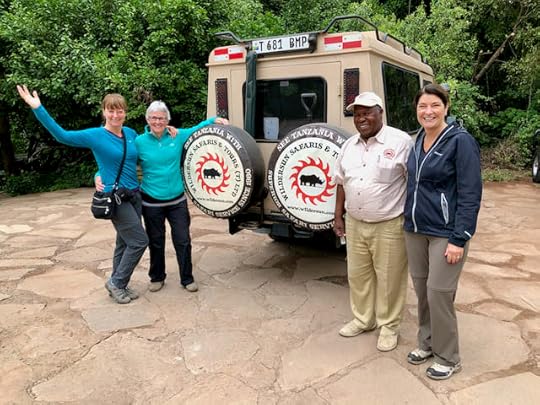
When I created the character of James in Blood Oath—the guide who drives Alex and General Martel through the Serengeti—I drew directly from our experience with our own guide. In the novel, when Alex and her father banter with their guide, when James educates them about animal behavior, when he navigates both the physical landscape and the cultural terrain with equal skill, those moments were informed by our real experience.
The bond between guide and guest in Africa runs deeper than the typical tourist relationship. James entrusted us with his knowledge, his stories, his country. In return, we gave him our trust when elephants jostled our vehicle, when lions stalked within feet of us, when he assured us the fog would lift once we descended into Ngorongoro Crater.
That trust became central to Blood Oath. When violence erupts and Alex faces impossible choices, her relationship with James serves as an anchor—a reminder that even in chaos, human connection persists. She also discovers that after trusting James to keep her safe as he guides them through the wilderness, it is now Alex who must protect him.
Flying Over the LandscapeAt the Seronera Airstrip, we boarded a Twin Otter—about 20 passengers—and took off from a dirt runway. “It was like being on a hop-on, hop-off bus,” I noted. “The captain kept hopping out to let people off and get their bags, and then she would climb back in and off we went again.”
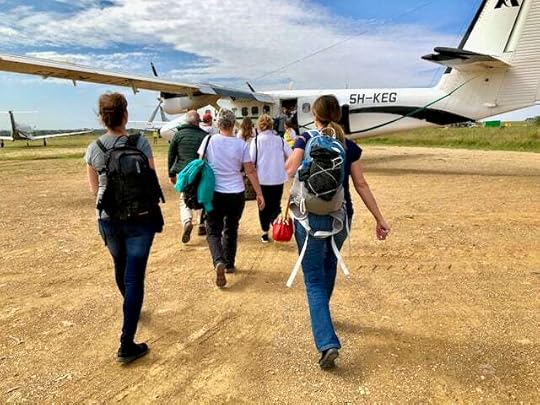
Our pilot hopped in and out of the cockpit between airstrips with the casual competence of someone who’d done this a thousand times. Watching her navigate the plane over the Serengeti with such effortless authority, I saw Alexandra Martel more clearly—not as an idea on the page, but as someone real.
From the air, we could see the circles of Maasai villages scattered throughout the plains. We flew over the arts and cultural center we’d visited days before—“really big complex from the air.” The perspective shift was profound: what seemed vast and overwhelming from ground level became ordered and comprehensible from above.
The Arusha Coffee LodgeIn Arusha, our new driver, Peter, took us to the Arusha Coffee Lodge—“a beautiful place with large outdoor tables where we had a wonderful lunch and walked around the grounds, including the Shanga studios where people with disabilities learn various arts and sell their wares: jewelry, blown glass, cloth, paintings, etc.”

We stayed at the lodge for 4-5 hours, surrounded by coffee plants and the scent of roasting beans, watching artisans create beauty despite physical limitations that might have limited others. The Shanga studios embodied something I’d witnessed throughout Tanzania: resilience, adaptation, the refusal to be defined by circumstance.
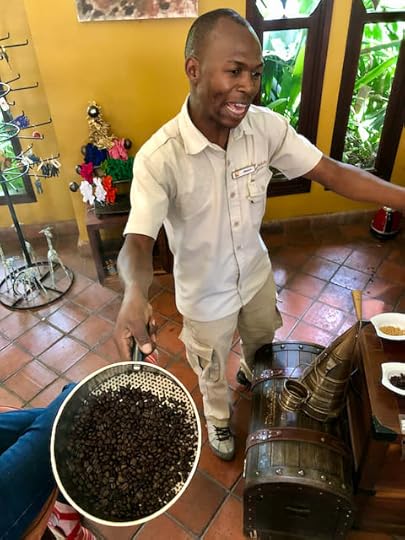
In Blood Oath, when Alex encounters the child soldier Kijana, she sees that same resilience—a boy forced into violence but not defined by it, surviving through adaptation, clinging to humanity in circumstances designed to destroy it. Her decision to spare him, to give him a chance at redemption, reflects what I learned watching those artisans in Shanga: that disability, trauma, and circumstance don’t determine destiny. Choice does.
The Universal Language of FamilyThroughout our journey, I was struck by how universal certain human experiences are. Sanka and his Maasai family lived in circular huts covered with cow dung, following traditions unchanged for centuries. Yet when he spoke of his children’s education, his hopes for their future, his pride in his culture, I heard the same sentiments I felt about my children, the same that parents everywhere voice about theirs.
In the novel, General David Martel and Alex’s relationship embodies a sacred parent-child bond. The blood oath they swear when Alex is eleven—“Blood of my blood, until my last breath”—echoes the Maasai understanding that family ties transcend everything else. When Alex risks everything to save her father, she’s honoring not just their personal oath but a universal truth: we protect those we love, regardless of cost.
The Cost of ConnectionOur safari wasn’t without witnessing Tanzania’s complexities. Throughout our journey, James educated us about the ongoing challenges facing Tanzania’s national parks—the constant threat of poaching, the difficult balance between conservation and local communities’ needs for land and resources, the economic pressures that drive wildlife trafficking.
The rangers we saw patrolling the parks were fighting to protect wildlife from those who would exploit it for profit. The Maasai village we visited was navigating the impossible tension between preserving ancient traditions and surviving in a cash economy. James himself represented the bridge between worlds—educated, fluent in multiple languages, descended from the Chagga people, but working in Tanzania’s modern tourism economy.
These complexities became essential to Blood Oath’s authenticity. The novel doesn’t present Tanzania as either paradise or hellscape, but as a real place where real people navigate impossible choices. In the fictional story, I dramatized the very real threats that rangers face—the poaching incidents that make headlines, the violence that erupts over resources and territory. The ranger ambush in the novel is fiction, but it’s rooted in the actual dangers that Tanzania’s wildlife protectors confront.
Lemarti, the antagonist, isn’t a cartoon villain—he’s a product of his environment, shaped by colonial history, resource exploitation, and the power vacuums that international actors eagerly fill. When Alex faces him in the novel’s climax, she’s not just fighting evil. She’s confronting the consequences of centuries of extraction—of resources, of autonomy, of dignity. Her victory isn’t triumphant; it’s necessary and tragic in equal measure.
What Tanzania Taught MeBy the time we boarded our flight from Kilimanjaro—first to Amsterdam, then onward to Paris—I had filled my journal with observations, my camera with images, and my heart with something harder to quantify. Tanzania had changed us. Changed me.
I learned that vulnerability and strength often occupy the same space—that the tourists who climb into open vehicles surrounded by lions are both incredibly brave and profoundly foolish. That beauty and danger don’t exist in opposition but in conversation with each other. That ancient wisdom and modern reality must somehow find a way to coexist.
Most importantly, I learned about connection—between humans and nature, between cultures separated by oceans and united by fundamental truths, between the person I was when I arrived and the person I became through witnessing Tanzania’s magnificent complexity.
The Story That Had to Be WrittenFlying home, I knew I would write about this experience one day. But I didn’t want to write a travel memoir or a nature documentary in prose form. I wanted to capture what Tanzania had taught me about family, honor, sacrifice, and the bonds that define us.
Blood Oath became that story—Alex and her father’s safari interrupted by violence, their bond tested by impossible circumstances, their love for each other driving decisions that challenge everything they believe about justice and duty.
The novel asks questions Tanzania asked me: What would you sacrifice to protect those you love? How do you honor tradition while embracing change? When do the rules that govern civilization give way to the older, deeper rules written in blood and bone?
Coming Full CircleNext Thursday—in our final installment—I’ll share how these experiences crystallized into Blood Oath, how real moments became fictional scenes, how actual people inspired complex characters, and how a simple safari became the foundation for Alexandra Martel’s most personal mission.
But today, I want to acknowledge something that only became clear looking back: Tanzania didn’t just inspire a novel. It reminded me why I write thrillers in the first place.
We tell stories about heroes facing impossible odds because life itself often presents impossible challenges. We write about sacrifice and duty because those are not just abstract ideas, they’re everyday realities for paramedics on the scene of a shooting or car wreck on the highway, for police officers making split-second decisions in the field, for firefighters responding to an alarm, for military personnel deployed far from home, for rangers protecting wildlife in remote wilderness, for Maasai families navigating modern life, and for anyone who chooses the harder right over the easier wrong.
Tanzania showed me that the truest adventures aren’t fantasies. They’re reflections of the world as it actually exists—beautiful, dangerous, complex, and utterly worth fighting for.
That’s why I write thrillers. Not to escape reality, but to honor it.
Asante sana to James, to Sanka, to every Tanzanian who welcomed us and shared their world. You gave us more than memories. You gave us truth.
And truth, as any writer knows, is the only foundation strong enough to support fiction.
Steve Urszenyi
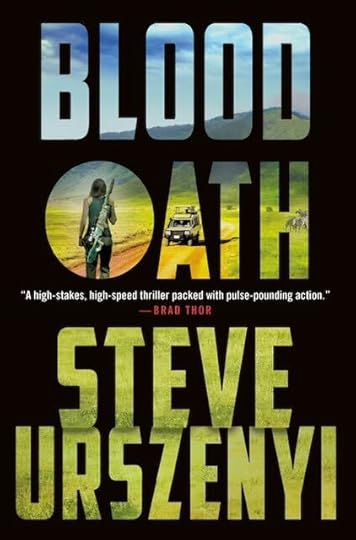
Blood Oath releases November 18, 2025—just 12 days away. Preorder your copy today and discover how the greatest show on Earth inspired Alexandra Martel’s most dangerous mission.
🇺🇸 Amazon US: Order on Amazon US
🇨🇦 Amazon Canada: Order on Amazon Canada
📖 Indigo Books: Order on Indigo Books
🏢 Barnes & Noble: Order on Barnes & Noble
📚 Novel Spot (Local Indie): Order at Novel Spot



